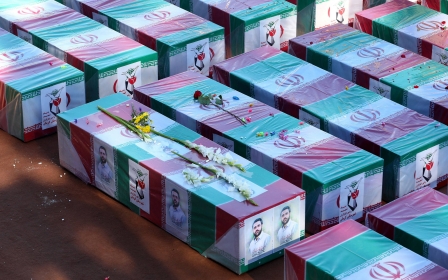Iranian press review: Criticism of government over Islamic State attack leads to arrests

Arrests over Kerman attacks criticism
Several people have been arrested over growing criticism of the Iranian government's handling of the terror attacks in the city of Kerman earlier this month, which claimed over 90 lives.
According to the Hamshahri daily, an outspoken establishment critic, Sadegh Zibakalam, was summoned to court for stating that Israel could not be behind the attacks.
Although the Islamic State claimed responsibility for the attacks 24 hours after the incident, a number of Iranian officials suggested that Israel might be responsible for the attacks.
Along with Zibakalam, six other individuals were also summoned to court, although their identities were not revealed.
Stay informed with MEE's newsletters
Sign up to get the latest alerts, insights and analysis, starting with Turkey Unpacked
Additionally, another unidentified citizen in the city of Yazad was arrested due to a social media post criticising the establishment for the attacks.
On Monday, reformist politician Mohammad Javad Haghshenas criticised the intelligence and security services for prioritising the enforcement of the obligatory Islamic hijab law over preventing attacks against citizens.
"This will happen when you deploy forces to check proper Islamic hijab and when you use city cameras to identify a woman's headscarf position," Khabar Online quoted Haghshenas as saying.
He added that the security forces' harsh enforcement of the hijab law had diminished their energy and social status among ordinary citizens.
Outcry over flogging for inappropriate hijab
The flogging of an Iranian woman for posting a photo on social media depicting her walking on the streets without a hijab and wearing a skirt and shirt has provoked an outcry.
On Monday, the Shargh daily reported that Kurdish-Iranian activist Roya Heshmati, accused of "injury to public chastity" for not adhering to the hijab law, was flogged 74 times.
'This whip struck at the very essence of religious spirituality, dismantling not only the individual's personality and dignity but also eroding the sacred foundations of sharia'
- Shahindokht Molaverdi, former minister
The news sparked anger among dissidents, and an immediate wave of support for Heshmati emerged on Persian social media.
One day later, even the local media, facing heavy-handed censorship and a crackdown for covering any opposition to the Islamic hijab law, reacted to the sentence by publishing opinion pieces by political activists and former officials.
On Tuesday, the reformist Etemad daily published an opinion piece by Shahindokht Molaverdi, a former vice president for women and family affairs in President Hassan Rouhani's government, lambasting the judicial system for the flogging.
"This whip struck at the very essence of religious spirituality, dismantling not only the individual's personality and dignity but also eroding the sacred foundations of sharia," she wrote.
Abbas Abdi, a prominent analyst and former political prisoner, went further and criticised sharia law, in which flogging is ordered as a punishment for acts considered crimes against religion.
"The act of whipping has evolved beyond mere physical torture; it has transformed into a spectacle of public humiliation," he stressed.
"The wielders of the whip are no longer reminiscent of the punishers from bygone eras. Instead, they unleash their anger, hatred, and malice not only upon the body of the condemned but also upon the collective conscience of society."
Unemployment grips textile workers
Over 150 workers of the Borujerd textile factory have found themselves without jobs as their contracts were not renewed at the beginning of January without prior notice, leaving them struggling to secure alternative employment, the Ham Mihan daily reported.
According to the Borujerd Labour Department, approximately 330 workers have faced non-renewal of contracts since April. This sudden decision echoes historical patterns, with similar mass firings occurring at the factory in 2009 and 2017.
In interviews with the daily, four sacked workers shed light on the challenging working conditions, including delayed salary payments ranging from three to four months and contractual uncertainties.
The factory's claim of financial strain, citing a lack of inventory and decreased sales, was met with scepticism as workers point to nationwide discounts and international sales.
One worker revealed promises of additional salary for increased production, only to face disappointment when the factory failed to deliver on its commitments.
The crisis at Borujerd Textile Factory is not a rarity but rather emblematic of a larger, systemic issue plaguing numerous factories and companies.
During the past two decades, many entities, once successfully operated under government management, were sold at remarkably discounted rates to individuals closely aligned with the establishment.
This privatisation strategy, marked by questionable deals, often led these enterprises into dire financial crisis despite substantial loans from the government.
*Iranian press review is a digest of news reports not independently verified by Middle East Eye
Middle East Eye delivers independent and unrivalled coverage and analysis of the Middle East, North Africa and beyond. To learn more about republishing this content and the associated fees, please fill out this form. More about MEE can be found here.





